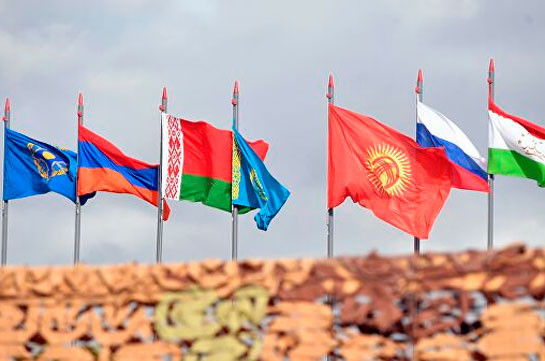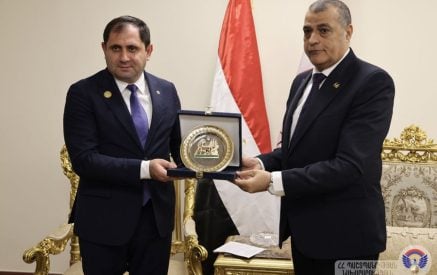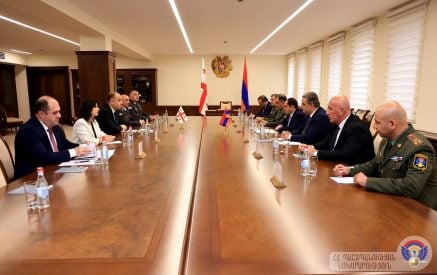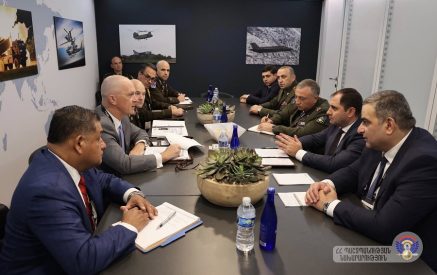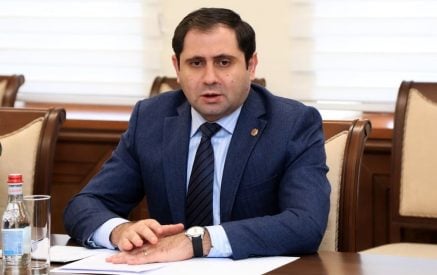by Raffi Elliott
YEREVAN — The Collective Security Treaty Organization (CSTO), a post-Soviet defensive alliance of six member-states including Armenia, has confirmed that it will hold large-scale military drills in Armenia this year. The war games, dubbed “Thunder 2021,” were announced as a tense standoff on the Armenian-Azerbaijani border enters its fourth week after several hundred Azerbaijani soldiers illegally entered Armenian territory on foot on May 12.
Armenia officially triggered Article 2 of the CSTO’s mutual security treaty just under two days after the incursion was recorded. However, aside from statements of concern, the organization has until now refrained from openly backing its South Caucasian ally in the matter. In the ensuing weeks, Azerbaijani forces fired on Armenian positions, killing one servicemember and later abducting six military engineers from Armenian territory in the middle of the night. Most recently, a shootout ensued when Armenian forces prevented Azerbaijani soldiers from stealing a shepherd’s flock near Gegharkunik’s Kut village.
Read also
CSTO Deputy Secretary General Valery Semerikov insisted last week that urgent measures, “primarily of a political and diplomatic nature,” were necessary to address the crisis. This position seemingly aligns with the Russian Federation, which has also repeatedly offered to act as a mediator to resolve the border demarcation dispute, without explicitly calling out Azerbaijan for breaching Armenian sovereignty.
Armenian Acting Prime Minister Nikol Pashinyan previously criticized the alliance’s reluctance to intervene, or even explicitly formulating its stance on the issue. He did reveal that CSTO leaders had privately pledged to support Armenia, but have yet to do so publicly. “We want clarity on this issue,” Pashinyan insisted during a parliamentary question period last month.
Armenian Acting Minister of Defense Vagharshak Harutiunyan said after a visit with his Russian counterpart, Sergey Shoigu, in Moscow last week “our partners looked into possible ways of resolving the situation and reached agreement on necessary steps.” However the Russian Ministry of Defense’s statement did not elaborate on any agreed solution.
More vocal support for Armenia’s position did come from the West, however. As part of a two-day visit to the French capital Pashinyan was warmly received by French President Emmanuel Macron, French Senate President Gérard Larcherm, and Paris Mayor Anne Hidalgo on June 1. Macron repeated earlier calls on Azerbaijan to immediately retreat from Armenian sovereign territory and formally accepted Pashinyan’s earlier offer that France join an international mediation effort to resolve the border demarcation issue. The French president even called his Azerbaijani counterpart with that same message. “We stand in solidarity with Armenia and we will continue to do so,” Macron said during the meeting between the two heads of state.
Echoing the French president, the Senate leader Gérard Larcher also called on Azerbaijani troops to withdraw and release all Armenian POWs, including those most recently abducted. “We raised the issue of Armenian prisoners of war with the president of the European Parliament, which resulted in the European Parliament passing a resolution that we assess as quite a positive step. We are not satisfied with this. Our efforts will be continued,” Larcher said.
Pashinyan also met with European Council President Charles Michel in Brussels the following day. Michel welcomed the pace of Armenia’s reforms since the 2018 revolution as well as the ongoing implementation of the Comprehensive and Enhanced Partnership Agreement (CEPA). Michel praised Armenia’s restrained stance regarding the Azerbaijani encroachment and called for Azerbaijan to find a peaceful resolution to the crisis.
The United States too commended Armenia for seeking a diplomatic solution. In an unusually strong statement, the US State Department specifically called on Azerbaijan to retreat to its May 11 positions and to release all prisoners. A similar memo was also shared with the Permanent Council in Vienna. The US Chargé d’Affaires Courtney Austrian pledged US support for a resolution to both the Karabakh conflict and the border demarcation issue through the Organization for Security and Cooperation in Europe (OSCE).
Pashinyan had publicly asked the OSCE to take an active role in the demarcation issue, including the possible deployment of peacekeepers, during a security council meeting on May 27, attended by representatives of parliamentary opposition parties. Acting Foreign Minister Ara Ayvazyan caused some controversy when resigning his post hours after the announcement, followed by one of his deputy ministers as well as the Foreign Ministry’s spokeswoman Anna Naghdalyan who held the post since 2018. The Prime Minister’s Press Secretary Mane Gevorgyan called on Ayvazyan to clarify a later comment that Foreign Ministry would “never allow policies that would hurt Armenia.” The OSCE Minsk Group responded to Armenia’s request the next day, calling on all sides to resume peaceful negotiations under its auspices.
The border crisis, which was apparently timed to coincide with the official launch of election season in Armenia – with the first Azerbaijanis crossing the border within 36 hours of parliament dissolving itself – has already affected the election campaign. The prime minister’s Civil Contract party has seen a steady drop in support over the month of May, as voters remain anxious over border security though he remains in the lead. These concerns have been amplified by leaked documents from exiled media tycoon Mikael Minasyan that Pashinyan intended to cede parts of Tavush province to Azerbaijan – a rumor which has been repeatedly denied. His challenger, former President Robert Kocharyan has put defense and security matters at the top of his campaign, with slogans reading “Towards a Stronger Armenia” plastered all around the Armenian capital. He has criticized both Pashinyan’s leadership during last fall’s 44-day war, and the ongoing border crisis.
However critics accuse the one-time president of having failed to secure a dignified peace and resolution to the Karabakh conflict during his decade-long tenure in office at a time when Armenia was still fresh off its victory in the previous war, and before Azerbaijan’s Baku-Tbilisi-Ceyhan pipeline became operational, providing revenue which would fund Azerbaijan’s decade-long weapons buildup, which Armenia could not match. Kocharyan, and his hand-picked successor, Serzh Sargsyan were also known to have presided over decades of entrenched corruption and nepotism in the Armenian military.
Pashinyan hit back at Kocharyan’s criticisms as well, saying that three years were not enough to reverse three decades of stagnation in the military. His earlier claim that he had made the biggest arms purchases in Armenian history has been seemingly backed up by figures recently released by the SIPRI database.
With parliamentary elections scheduled for June 20, the campaign season has officially kicked off on Monday, June 7, and 28 parties and alliances have been registered to take part in the vote.




















































